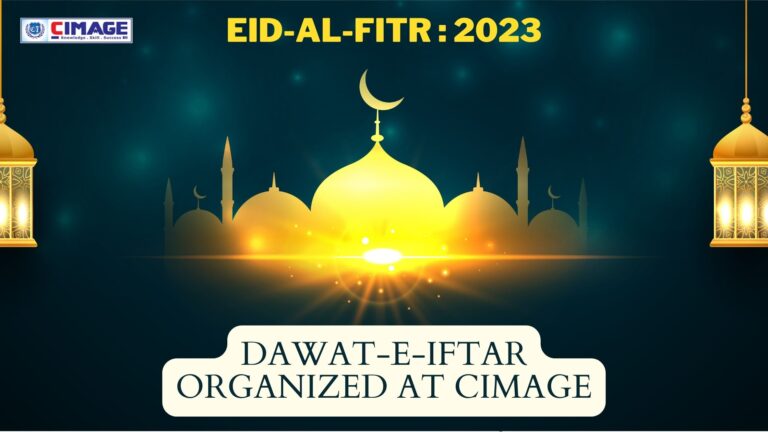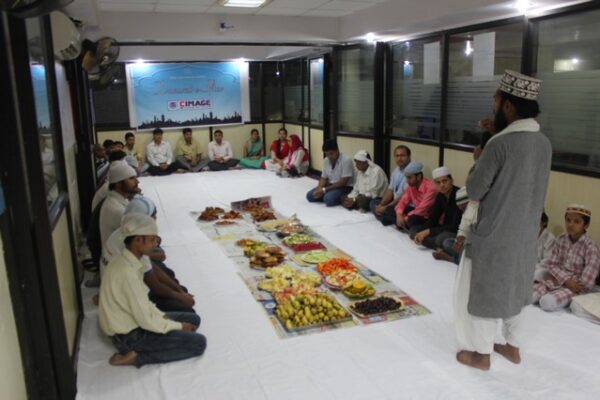
Eid 2023 | Date, Significance, Importance | Dawat-E-Iftar Organized at CIMAGE
Eid-al-Fitr 2023: Introduction
Eid-al-Fitr, also known as Eid, is a significant Islamic festival celebrated by Muslims worldwide. It marks the end of the holy month of Ramadan, during which Muslims observe fasting from dawn to sunset. Eid-al-Fitr is determined based on the lunar Islamic calendar and falls on the 1st and 2nd day of Shawwal, the 10th month of the Islamic calendar.
When is Eid-al-Fitr 2023?
In 2023, Eid-al-Fitr is expected to be celebrated on April 22, depending on the sighting of the moon of Shawwal. (Please note that the actual date may vary as per the lunar calendar and the sighting of the moon in different regions).
Significance and Importance of Eid-al-Fitr
Eid-al-Fitr is a significant festival for Muslims as it marks the end of Ramadan, which is considered the month of fasting, prayer, reflection, and self-control. It is a time for Muslims to come together with family and friends, offer special prayers called Salat al-Eid or Eid Salah, and celebrate with joy and gratitude.
Eid-al-Fitr holds religious, social, and cultural significance in Muslim communities. It is a time of forgiveness, charity, and compassion. Muslims give to the poor and needy, called Zakat al-Fitr, to ensure that everyone in the community can partake in the celebrations.
It is also a time for Muslims Eid-al-Fitr, also known as Eid, is a significant Islamic festival celebrated by Muslims worldwide. It marks the end of the holy month of Ramadan, during which Muslims observe fasting from dawn to sunset. Eid-al-Fitr is determined based on the lunar Islamic calendar and falls on the 1st and 2nd day of Shawwal, the 10th month of the Islamic calendar.
Reasons to Celebrate Eid-al-Fitr
There are several reasons why people fast during Ramadan:
- Religious Obligation: Fasting during Ramadan is seen as a religious obligation for Muslims, as it is mentioned in the Quran, the holy scripture of Islam, as well as in the Hadith, the sayings and actions of the Prophet Muhammad. It is considered a way to fulfill one’s religious duty and earn a reward from Allah (God).
- Spiritual Purification: Fasting is believed to provide an opportunity for Muslims to spiritually purify themselves by abstaining from food, drink, and other physical desires from dawn to sunset. It is considered a time for self-reflection, self-control, and self-discipline, helping Muslims to develop a sense of mindfulness, self-awareness, and self-improvement.
- Increased Piety and God-consciousness: Fasting is believed to increase piety and God-consciousness among Muslims. By voluntarily refraining from food, drink, and other physical desires, Muslims are encouraged to develop a heightened awareness of their dependence on Allah and strive to be more mindful of their actions, thoughts, and speech.
- Empathy and Solidarity with the Less Fortunate: Fasting during Ramadan is also a means to develop empathy and solidarity with those who are less fortunate and do not have enough food or resources to fulfill their basic needs. It serves as a reminder of the blessings and abundance that one may have and encourages Muslims to be charitable, compassionate, and generous toward those in need.
- Community and Family Bonding: Fasting during Ramadan also fosters a sense of community and family bonding. Muslims typically break their fast together with family, friends, and community members during Iftar (the meal to break the fast at sunset) and often come together for special Taraweeh prayers (nightly congregational prayers during Ramadan). This promotes social cohesion, strengthens relationships, and creates a sense of togetherness and unity among Muslims.
-
Dawat-E-Iftar is a term used to refer to the traditional Iftar feast or meal that is organized during the month of Ramadan to break the fast at sunset.
CIMAGE Group of Institutions organizes Dawat-E-Iftar events during Eid-al-Fitr, which bring together community members to share a meal, exchange greetings, and celebrate the festival together. It is a time of joy, camaraderie, and bonding among the Muslim community.
The Dawat-E-Iftar organized at CIMAGE Group of Institutions involves a variety of traditional and delicious food items that are typically consumed during Iftar, such as dates, fruits, samosas, pakoras, biryanis, and sweets. It provides an opportunity for people to come together, strengthen community bonds, and celebrate the spirit of Ramadan and Eid-al-Fitr.
Overall, Eid-al-Fitr is a significant festival for Muslims worldwide, and Dawat-E-Iftar events organized at CIMAGE Group of Institutions provide an opportunity for the community to come together, celebrate, and foster a sense of togetherness and goodwill.
Summary
In summary, fasting during Ramadan is a significant religious practice for Muslims, aimed at fulfilling religious obligations, achieving spiritual purification, increasing piety and God-consciousness, developing empathy and solidarity with the less fortunate, and fostering community and family bonding. It is considered a time of increased worship, reflection, and self-improvement, and holds deep religious and cultural significance in the lives of Muslims.















